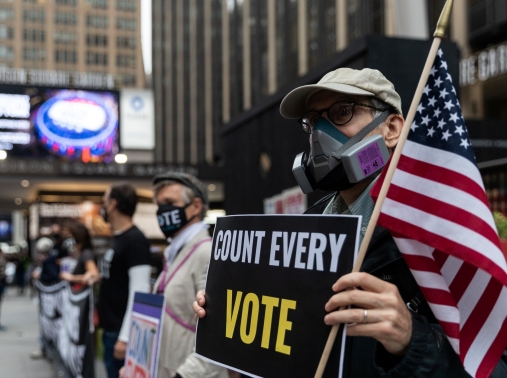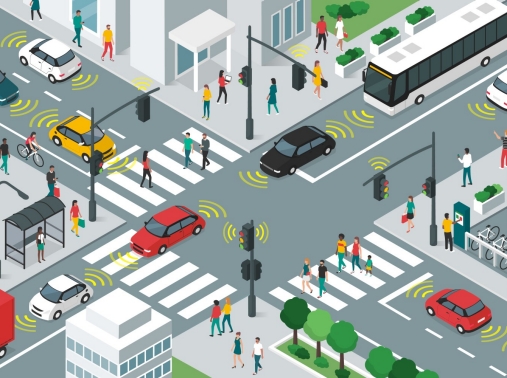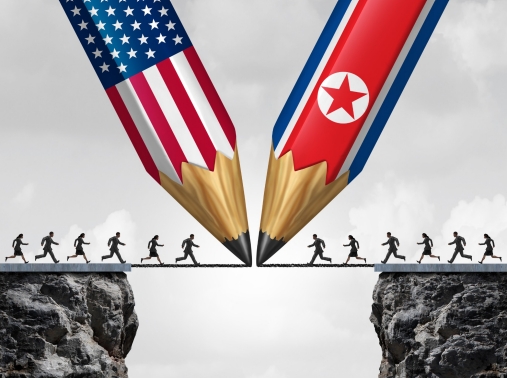|
|
RAND research and commentary on the issues that matter most
|
Oct 29, 2020
|
|
|
|
|
Photo by MarsBars/Getty Images
|
|
|
|
What might happen if countries pursue their own perceived interests when a COVID-19 vaccine is available—rather than focusing on global coordination? Such “vaccine nationalism” could cost the world up to $1.2 trillion per year in GDP, according to a new RAND Europe study.
The analysis shows how countries would incur economic penalties—for the global population and for themselves—if they initially immunize only their own citizens. That's because as long as the virus is not under control in all regions, there will continue to be a global cost associated with COVID-19. “A globally coordinated multilateral effort to fight the pandemic is key,” says lead author Marco Hafner, “not only from a public health perspective but also an economic one.” Read more »
|

|
|
A man holds a sign outside a polling place at Madison Square Garden on the first day of early voting in New York, October 24, 2020. Photo by Jeenah Moon/Reuters
|
|
In May and June, RAND conducted a survey to learn more about Americans' views on voting during a pandemic. In August, we followed up with these same Americans to find out whether their views had changed. Overall, there were small shifts, including a slight decline in voters' expectations about safety and a drop in the percentage of respondents who said that they expect their vote to be counted correctly. There were also modest shifts in whether and how people intended to vote. Importantly, the authors note that some voters' intentions may change right up to Election Day.
Read more »
|
|

|
|
Image by Ada Yokota/Getty Images
|
|
Between August and September, 865,000 women left the U.S. labor force. Some reduction in workforce participation is expected during a recession, says RAND's Kathryn Edwards. But during the pandemic, the concern is that women aren't simply sitting out of a difficult job market. Rather, the need for caregiving amid school and day care closures may be pushing them out. Meanwhile, it remains to be seen whether public or corporate policies will change to help working women receive the support that they've long deserved but gone without, says Edwards.
Read more »
|
|

|
|
Image by elenabsl/Adobe Stock
|
|
Deciding when automated vehicles are safe enough to hit the road is not straightforward, especially because AV technology is constantly evolving. A new RAND report examines this challenge, assessing the measurements, processes, and thresholds used to determine AV safety. The authors conclude that there is no single best approach. Rather, different methods for understanding safety can complement one another. Whatever the path forward, consistent, coherent, and comprehensive messages about safety will be essential to nurturing public trust in AVs.
Read more »
|
|

|
|
Jayson Chang teaches civics at Santa Teresa High School in San Jose, California. Photo courtesy of Jayson Chang
|
|
Civics was once the cornerstone of an American education. Today, it's not even a graduation requirement in some schools. But a growing number of states and school districts are again recognizing a need to prepare students for the sometimes-messy realities of democracy. RAND researchers have been focusing on civics education, too. Their recent findings suggest that schools can do more to help students understand current events; learn how institutions (should) work; and guard against “Truth Decay,” the diminishing role of facts in American public life.
Read more »
|
|

|
|
Image by wildpixel/Getty Images
|
|
In a new report, RAND's Rafiq Dossani examines America's historical inability to engage North Korea in denuclearization negotiations—and charts an alternate path forward. First, he identifies three primary reasons for past U.S. failures: disagreements on the goals of negotiations, inadequate domestic and international support, and the failure to use trust-building mechanisms. Dossani then outlines a new approach, the portfolio method, that addresses these issues and aims to engage all parties more effectively.
Read more »
|
|
|
You already get the latest insights from RAND in your inbox. Why not your earbuds?
Policy Currents is available as a weekly podcast. Five minutes, every Friday.
Subscribe now »
|
|
|
|
|